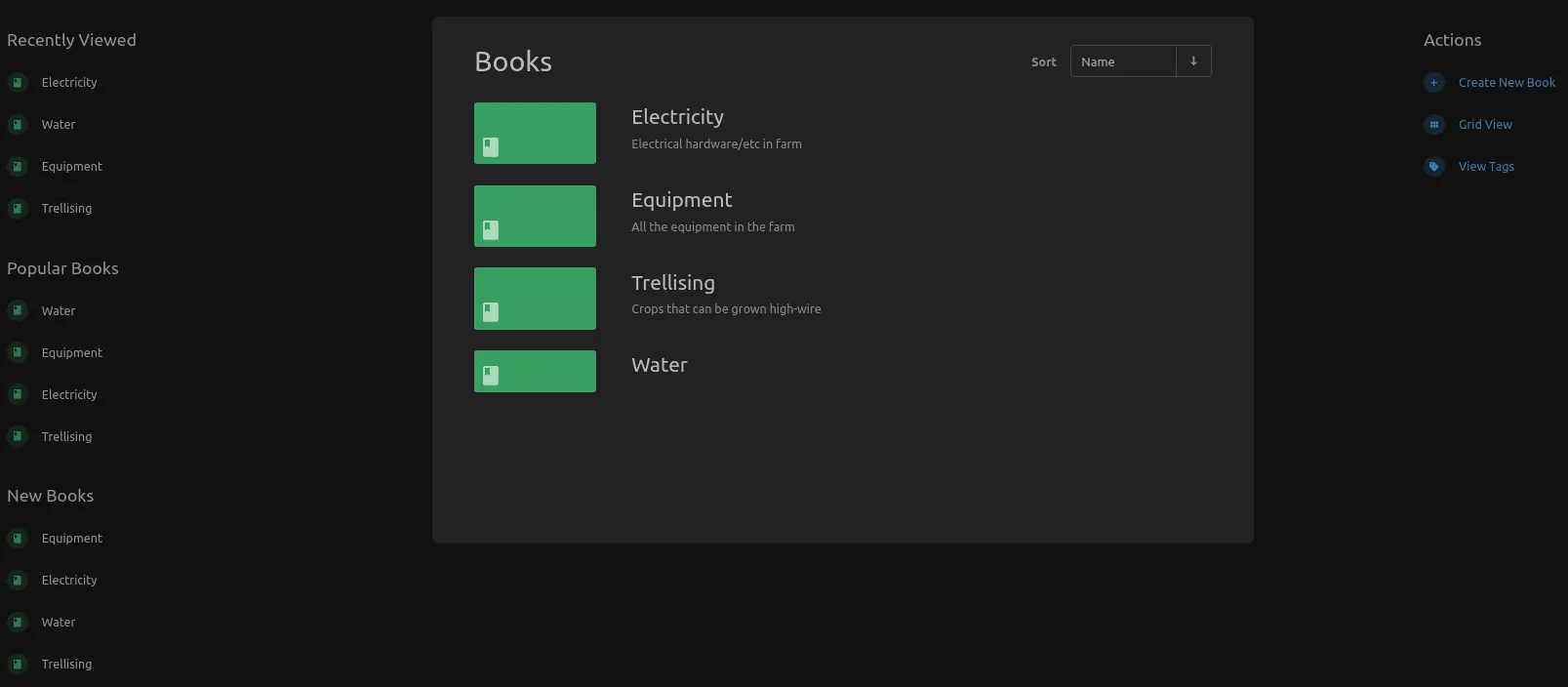I have a bookstack instance self-hosted and I quick like the program and workflow. I like having ‘books’ of information to separate/organize my information. It feels very much like folder heirarchy to me, and while that has its issues, I prefer it. Being able to add tags to pages helps alleviate some of those issues and helps with a broad search for an idea when I don’t know where it is stored down the line. Here is a quick view of my bookstack. It’s nothing fancy, but a visual to see what I’m talking about.

It’s great software. But I am very fond of software designed to be readable in 100 years. Meaning that the file does not require the program to be read. Text files (.txt, .rtf, .odt) are formats that are designed to be read in the future without MS Word, or Notepad; .doc, .docx, etc without microsoft might not be readable in 100 years without having MS software. That is why I like taking notes with markdown and why I like software like QownNotes, obsidian, and logsec which produce files that are readable without the program. So if they crash and burn, I don’t lose my data. With Bookstack, I cannot view that data without bookstack. And if I wanted to move my documents to a different software, I cannot export everything. I can export page-by-page but that’s only reasonble on a small scale. So, while I like the program, I would like to move to another program for my wiki/personal knowledge base.
For those wondering why I am worried about this: I’ve run into many walls with software problems in my life:
- software I use being abandoned
- new terms of service I don not agree with blocking me from using the program I like
- price hikes for software I use that are not worth it but I’m vendor locked and so I have to either pay or go the tedious route of moving my data slowly over because there is no export possibilities. 4)I am using a new device and I can’t access or view my data because the software doesn’t work on the device, hasn’t been ported over, or isn’t usable on the novel form factor of the device.
My worries with bookstack flow from there. It may be a good program, but what if my needs change, can I move my data easily?
In my search, Tiddlywiki was a standout in this view because it is a quine. It contains all its code to run/display itself (it’s a quine). So in 100 years, you should be able to open a tiddlywiki and it will contain be able to be read. However, I am having a hard time adapting to tiddlywiki’s way of doing things. Far less user friendly than Bookstack in ease of use. Thus I am writing this post to see if anyone else has ideas. Is there a way to make tiddlywiki look/work more like Bookstack in the book→pages (or folder→files) workflow? Or do you know of another piece of software for a knowledge base that meets the ideas above?

DokuWiki. Everything is a text file that can just be copied to a web server. It doesn’t even require a database. And since all the wiki pages are plaintext markdown files, they can still be easily accessed and read even when the server is down.
when I was starting Tiddlywiki I think I was bouncing between which one to try, Dokuwiki or Tiddlywiki. I decided on TW since it didn’t need a server to run. Considering how it was a race between those two, this suggestion hits the nail on the head. Like the other commenter, I would prefer something that doesn’t require a server, but since it just uses text files, even if I don’t have access to the server I can view the text file and edit them on the go as long as i have them sync to the device when it is active. Since my sever is LAN only, I just need to learn how to setup a vpn connection to my server when I’m away from the office and this program would be even more convenient. Maybe I should get on that sooner. Always something to learn and do! Now what to prioritize first~

I started out in Ikiwiki and migrated to DokuWiki. Growing pains aside, it was good but only because I had a decent bit of software running the server for me.
I would definitely prefer something that didn’t need a server though

I set up a wiki.js docker container for myself, mainly for keeping track of video game achievement lists in things I’m playing, but I’m probably gonna plop all my docs into it at some stage. It does basically use folder hierarchy, and I have it set to backup to a self-hosted Gitea git repo every 24hrs as well, so I have somewhere to pull all the markdown docs (and their edit history) from if needed, too.
wiki.js looks really great. I have to put this on my list of things to try out. One worry I have is how lightweight it is on tiny computers. I use are older devices, like a raspberry pi 2, so I’m always wary if programs like this will be smooth. When I started organizing my notes, I tried Joplin because it seems so universally loved. It was a good program but it was nigh unusable on my raspberry pi 2. So that worry is always in the back of my head now when I’m looking for software longterm (and why I will never use an electron app again as it is not a framework that cares about older devices). Since this is on a server, maybe it will be lightweight on devices. I don’t know how much fancy web features it uses and I guess I’ll have to test it to see how it goes. thank you!

+1 to wiki.js it just works as I expect it to, easy to understand.
- Fizz ( @Fizz@lemmy.nz ) 4•7 months ago
One giant text file and grep.

This is essentially what org-mode files are, plain text files with a bit of markup so they can be organised or rendered to other formats.
I’m impressed by this suggestion. It accomplishes most of what I asked and is elegant in its simplicity. It also shifted my perspective to look at the very basic needs and consider what I need on top of that. Which was actually very helpful for me. I will not be going this route, but your suggestion is greatly appreciated.

Oof I gave up in this search. Closest thing I found was MkDocs and Docusaurus which are static site generators of markdown content. I wanted an editor too, but they don’t have one.
Regarding wiki.js, I liked it, but the way it manages folder hierarchies is messed up.

Well I hesitate to recommend it for use by others, but what I use is my home-grown zknotes. Markdown notes that you can link together, so any note can be a tag. There’s a query syntax that allows searching note titles or content or tags. Notes live in a sqlite database. You can upload binary files like movies or images. Currently working on synchronization between instances, that will enable a phone app that syncs with a home server. If you run a server with it you can make documents public as a blog.
Downsides: the interface is a bit kludgy, and probably won’t improve until I’m done with sync and the app. No cli interface for searching or export. No code highlighting yet. Not many users so the multi user capabilities are mostly untested.
I just took a look at the docs on zknotes, which show off how zknotes work. I really love the links at the bottom of each document! Do the links break if you change the title of the other note? I had that happen in QOwnNotes and it was a very annoying realization after I’d renamed a bunch of notes to standardize things.

The links are by numeric id, but displayed by title. You can’t change a note’s id, but you can change the title all you like.
Future versions will transition to uuids which are unique across multiple instances, so no ID collision if you create a note on your phone and also on your home server.

I’ve been using Zim as a local desktop wiki for generic document organization. Mostly to keep track of roleplaying campaigns I run, but it’s good for all sorts of things. It stores its data as plain Markdown text files and each page can have a subfolder containing images “attached” to the page. There are several plugins to extend its functionality.
It’s not fancy, but it gets the job done that I want it to do. And if every copy of the program evaporated tomorrow the pages would be simple to make use of with other software, it’s all just Markdown.

Bookstack has a pretty robust API for things like adding/exporting content even if the UI doesn’t always have a way to do things.
Might be worth looking at this ready-made script and see if it serves your purpose (at the very least just to make your shift from BS a bit easier): https://gist.github.com/ssddanbrown/45acb913a7b873240b2d89781e74a7a4

If all the program needs to do is keep a set of nested lists of storage locations in a format that you set… Then it sounds like something you might find in any entry level college textbook in whichever language you prefer. At least the basic functionality that is, for a GUI you might be looking at the next book in the subject.
You could always try having a go at making your own. Between online materials and clumsy ChatGPT, I think it wouldn’t take much time to learn what you’d need.
🤷🏻♀️
